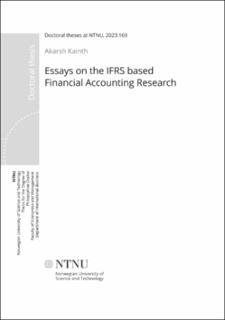| dc.description.abstract | SAMMENDRAG
Internasjonale regnskapsstandarder (IFRS) er kjent for å forbedre transparens, kvalitet på finansiell rapportering og internasjonal sammenstilling av finansielle rapporter. Siden EU innførte krav om bruk av IFRS i 2005, har akademikere og forskere forsket mye på effektene av å adoptere IFRS på kapitalmarkedene med hensyn til avkastning. Derimot, har få studier forsket på rollen til paradigmer og teorier i forklaringen av fenomener innenfor finans og regnskap, og de som finnes gir begrenset innsikt i den vitenskapelige og filosofiske basisen i fagområdet. Avhandlingen studerer derfor effektene av å adoptere IFRS på informasjonseffisiens i kapitalmarkedene, spesiell med hensyn til risikoelementet. I tillegg gir avhandlingen en gjennomgang av den konseptuelle dannelsen og rollen til teorier i forklaringen av fenomenene innenfor IFRS basert finansregnskap.
Tidligere forskning beskriver IFRS som fordelaktig for selskap og land som adopterte dem, ved å forbedre transparens, senke kapitalkostnadene, øke selskapenes oppfølging av utenlandske analytikere, forbedre sammenstillingen av finansielle rapporter og forbedre forvaltningen av investeringer på tvers av land. Mens mange akademikere har studert disse effektene med hensyn til virkningen av IFRS på aksjeavkastning og selskapenes kapitalkostnader, har få studier studert effektene av å adoptere IFRS på risikoelementet av informasjonseffisiens og den filosofiske og vitenskapelige basisen i fagområdet finans og regnskap.
Denne avhandlingen tar derfor opp effekten av å adoptere IFRS på konkursprediksjoner, systematisk risiko for aksjer, og unormal stokastisk volatilitet for bedrifter under fusjoner og oppkjøp og gir innsikt i den konseptuelle dannelsen og rollen til teorier innen fagområdet. Først dokumenterer kapittel 3 i denne avhandlingen fordelene med å bruke IFRS for kreditorer gjennom konkursprognoser for et utvalg av private svenske og norske selskaper. Kapittel 4 argumenterer for at bruken av IFRS ser ut til å ha redusert den systematiske risikoen for vanlige aksjer for selskaper notert på Oslo Børs. Kapittel 5 fokuserer på den informasjonsmessige rollen til IFRS under fusjoner og oppkjøp ved å undersøke den unormale volatiliteten under slike hendelser. Det er en statistisk signifikant sammenheng mellom adopsjon av IFRS og unormal stokastisk volatilitet. Til slutt gir kapittel 6 nyttige innsyn knyttet til den konseptuelle dannelsen og rollen til teorier i forklaringen av fenomenene som undersøkes i IFRS-basert finansiell regnskapsforskning, og gir perspektiver og anbefalinger for fremtidig forskning.
SUMMARY
International financial reporting standards (IFRS) are widely used standards known to improve transparency, financial reporting quality, and the comparability of financial reports. Since the mandate of IFRS by the EU in 2005, academics and scholars have extensively researched the effects of adopting IFRS on capital markets with regards to returns. Conversely, few studies have focused on the role of paradigms and theories in explanation of the phenomena in financial accounting research, and those that do exist provide only limited insights into the scientific and philosophical basis of the research stream. As such, this thesis studies the effects of adopting IFRS on capital markets, with respect to the risk element of informational efficiency, and provides a review of the conceptual formation and the role of theories in explanation of the phenomena within this research stream.
Past research painted IFRS as significantly benefiting adopting firms and countries by improving transparency, lowering the cost of capital, increasing firms’ following by foreign analysts, improving the comparability of financial reports, and improving the administration of cross-country investments. While many academics have addressed these issues with respect to the impact of IFRS on stock returns and firms’ cost of capital, few studies have focused on the effects of adopting IFRS on the risk element of informational efficiency and the philosophical and scientific basis of financial accounting research.
This thesis thus addresses the impact of IFRS adoption on bankruptcy prediction, the systematic risk of firms, and the abnormal stochastic volatility of firms during mergers and acquisitions (M&As) and provides insights into the conceptual formation and the role of theories within the research stream. First, Chapter 3 of this thesis documents the benefits of adopting IFRS for creditors through bankruptcy prediction for a sample of privately held Swedish and Norwegian companies. Second, Chapter 4 argues that the use of IFRS appears to have reduced the systematic risk of the common stock for firms listed on the Norwegian Stock Exchange. Chapter 5 focuses on the informational role of IFRS during M&As by examining their impact on the abnormal volatility generated during such events. A significant relationship is found between IFRS adoption and abnormal stochastic volatility. Finally, Chapter 6 offers useful insights related to the conceptual formation and the role of theories in explaining the phenomena investigated in IFRS-based financial accounting research and provides perspectives and recommendations for future research within this field. | en_US |

